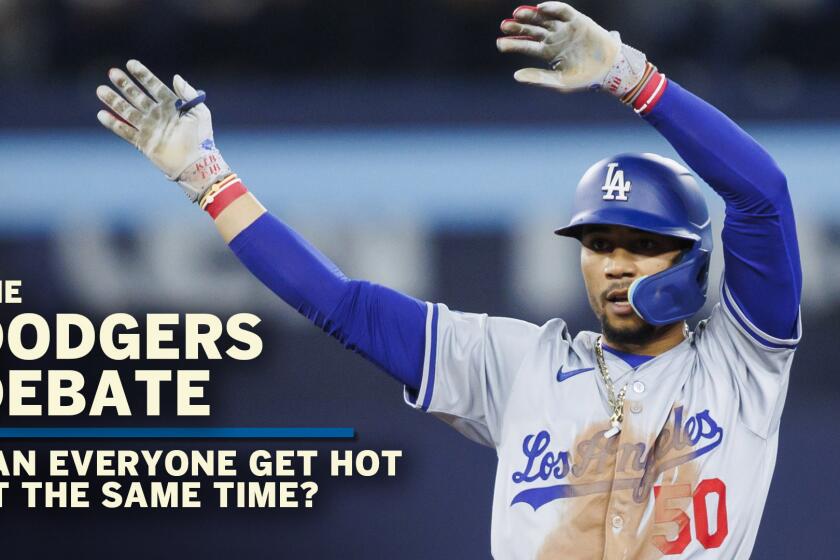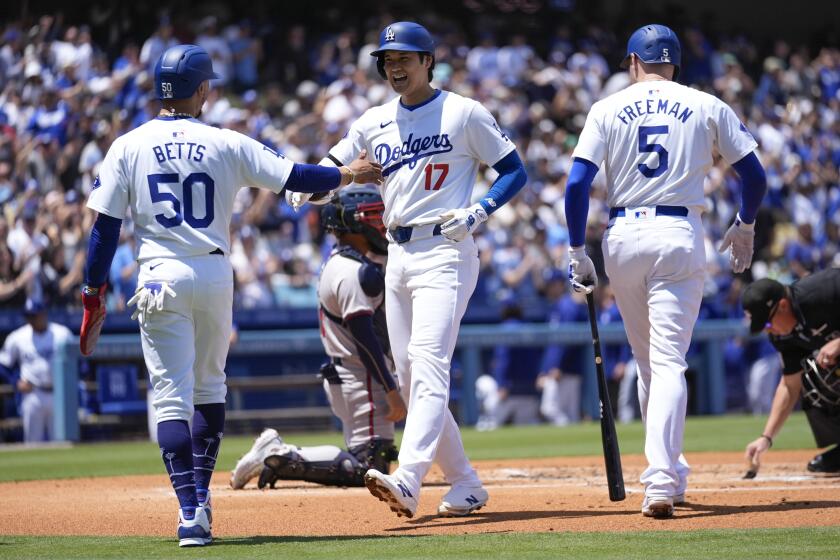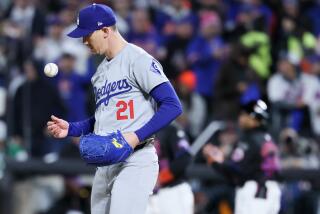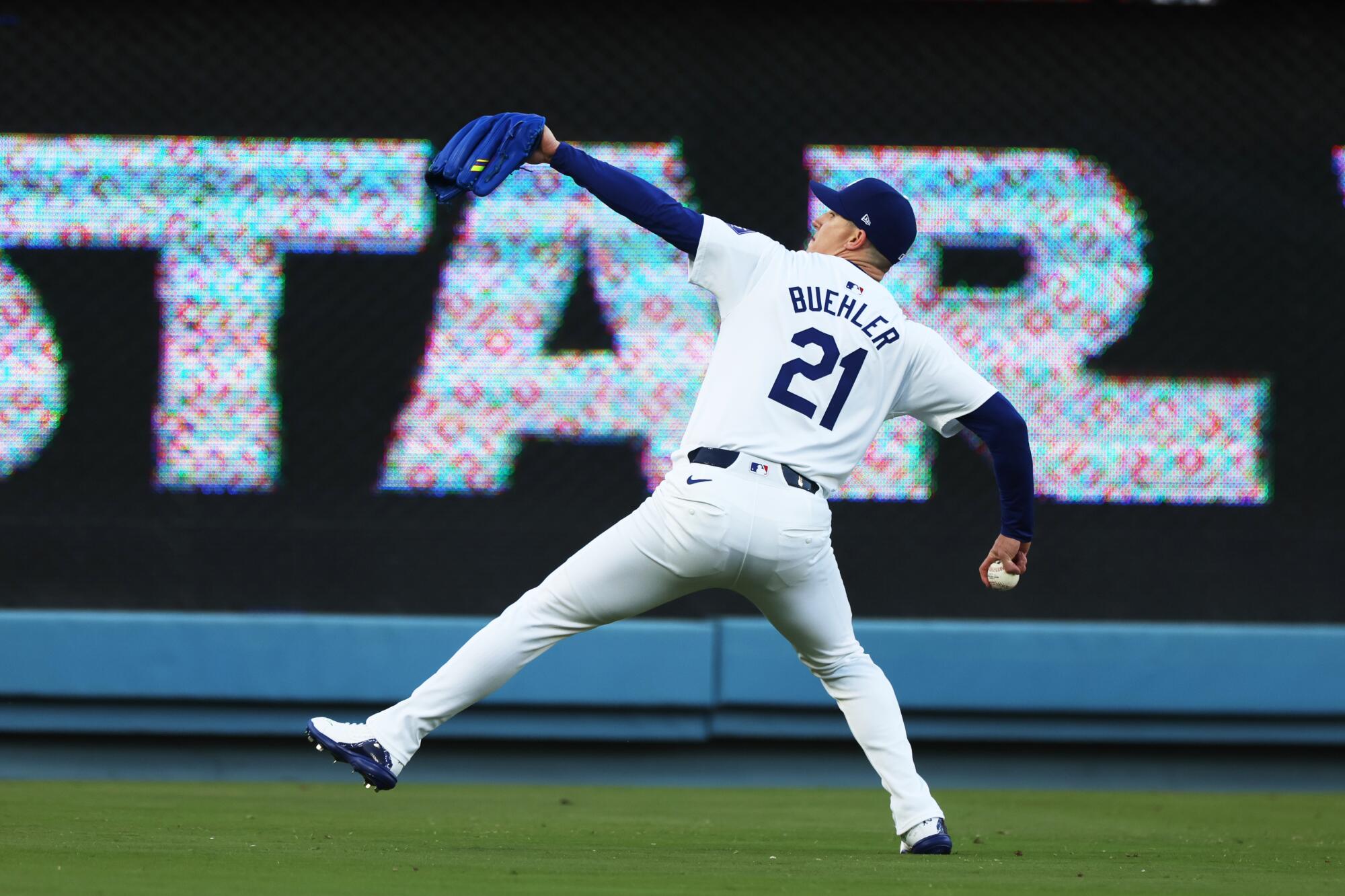
On an otherwise quiet backfield at the Dodgers’ Camelback Ranch complex this spring, a barrage of expletives rang out from the mound one late February day.
In his first time facing hitters all camp, Walker Buehler was already in fiery midseason form.
He’d pull a fastball inside, then admonish himself with a growl. He’d miss the other corner of the strike zone, and frustratingly blurt out a four-letter word. At one point, teammate Kiké Hernández playfully patronized the right-handed pitcher, telling him the misplaced pitches shouldn’t make him feel bad.
With a glare from the rubber, Buehler snapped back just as he started to fire his next pitch.
“He’s in his leg kick,” one Dodgers official in attendance cracked with a laugh, “and he’s still talking s—.”
Two years and a second Tommy John surgery later, the old Buehler — in mind, if not yet completely in body — was unmistakably back.
“Walker’s an elite competitor, that’s never gonna change,” president of baseball operations Andrew Friedman said. “So we’re excited to get him back and watch him compete for us every turn.”
On Monday night at Dodger Stadium, that return finally will happen.
Buehler will complete a 23-month comeback against the Miami Marlins, having finally finished a six-outing rehabilitation stint in the minor leagues last week.
“The biggest thing of being a starting pitcher … is having that ownership of the game,” Buehler said about his anticipation for Monday. “For me that’s what has always given me the butterflies or whatever. An entire organization’s success on that given day relies on you. So that’s probably the thing I’ve missed the most.”
When Buehler climbs the Chavez Ravine mound, it will put him at a crossroads in his once-burgeoning career.
He’ll not only be taking on a key role in the Dodgers’ starting rotation, Buehler will be embarking on his final season before free agency this winter. And he’ll be doing it all while trying to rediscover — or redefine — who he is as a pitcher.
“I’m just happy to be back,” he said. “And ready to help us win.”
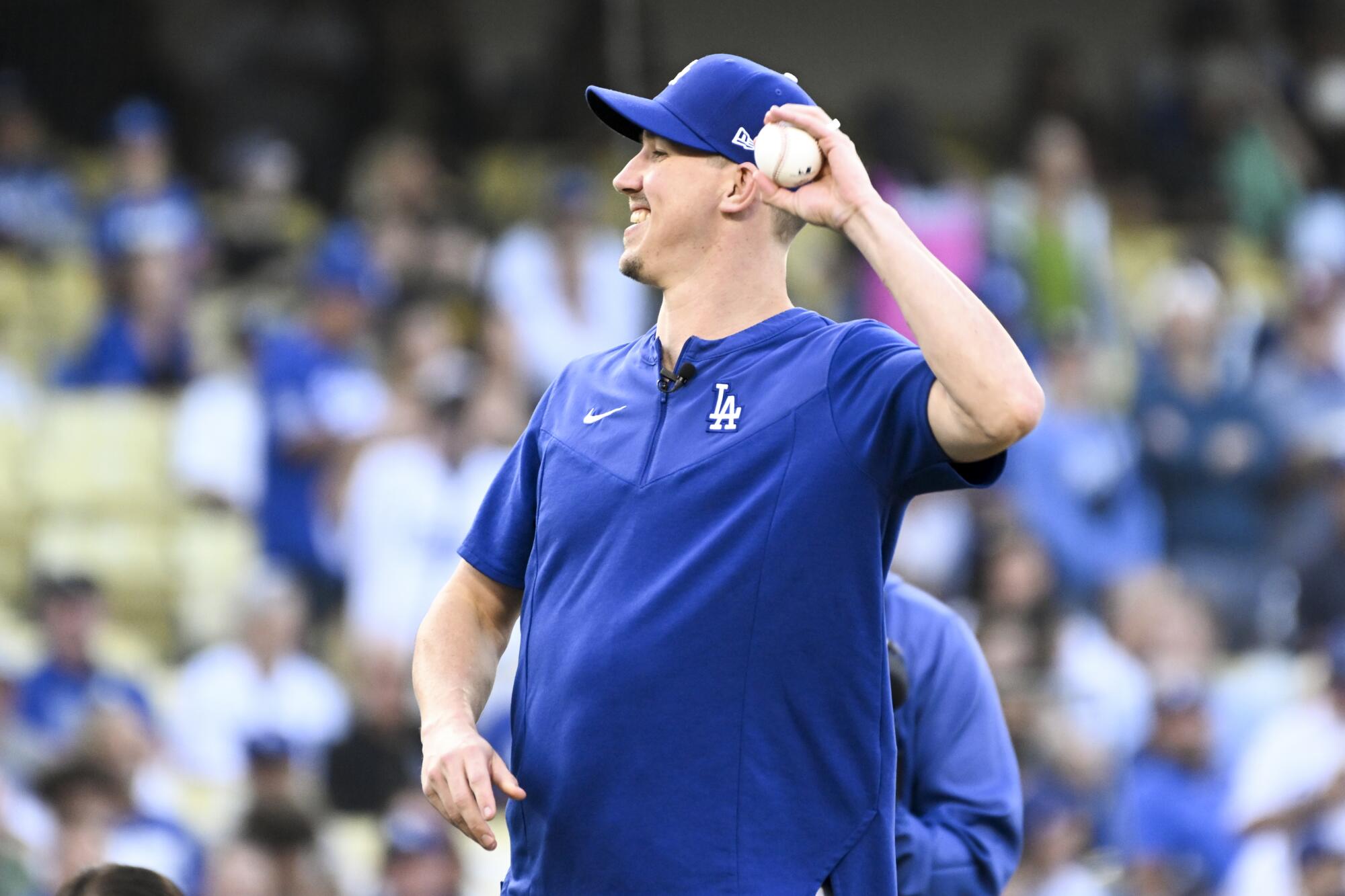
From the moment Buehler hurt his elbow in June 2022, Dodgers officials tried to pinpoint the exact root of the issue, holding a series of conversations with coaches, trainers and medical staff to identify if something could have been done to better protect the ace of their pitching staff.
“We’ll have a debriefing, and talk about some different things,” pitching coach Mark Prior said when Buehler was first hurt. “I think it’s healthy to do that with anybody that goes down.”
In the two years since then, that process never stopped — remaining front of mind through Buehler’s initial rehab in 2023, an unsuccessful comeback attempt at the end of last season, and an elongated ramp-up to Monday night.
At every step, Buehler and the Dodgers evaluated his pitching mechanics, contemplated changes in his delivery and tried to trace the causes of his ulnar collateral ligament tear.
The answer they arrived at, as Buehler stated matter-of-factly this spring, was less of an obvious explanation, but rather an acknowledgment of his undersized reality.
“When you’re a little bit smaller,” Buehler said, “there’s risks you gotta take.”
This is a trade-off Buehler accepted long ago.
To get the most out of his wiry 6-foot-2 frame, he learned to throw with maximum effort on every pitch.
Shohei Ohtani homers twice, giving him three in two games, as the surging Dodgers complete a three-game sweep of the Atlanta Braves.
To facilitate his rise to big league stardom — becoming a two-time All-Star and World Series champion — he pushed the limits of his body, and elbow, in a calculated bet.
“The style I throw with is kind of predicated on my ability to let every ball go hard,” Buehler said. “There’s risks that come with that.”
But not any regret.
“Had I not done that,” Buehler noted, “who knows if I get to the big leagues, or would be any good in the big leagues. There’s some cost-benefit to that.”
Now, the challenge for Buehler — who notably has added weight during his rehab process — is figuring out how to be good in the big leagues again.
The first checkpoint will be executing his delivery. His mechanics haven’t changed drastically since his injury, still marked by an over-the-head wind-up, high leg lift and straight-leg finish. “To the naked eye, it’s very similar,” Prior said. “It’s kind of his signature [move].”
Still, there are subtleties Buehler has been trying to hone, Prior said, “nuanced positions” with his back hip, front leg and general arm path that were affected not only by the two-year rehab process, but the bad habits Buehler developed in 2022, when his ailing elbow was causing problems even before his UCL blew out.
“I’ve always been a tinkerer,” Buehler said. “Health-wise I feel great. Now it’s just about getting my rhythm back.”
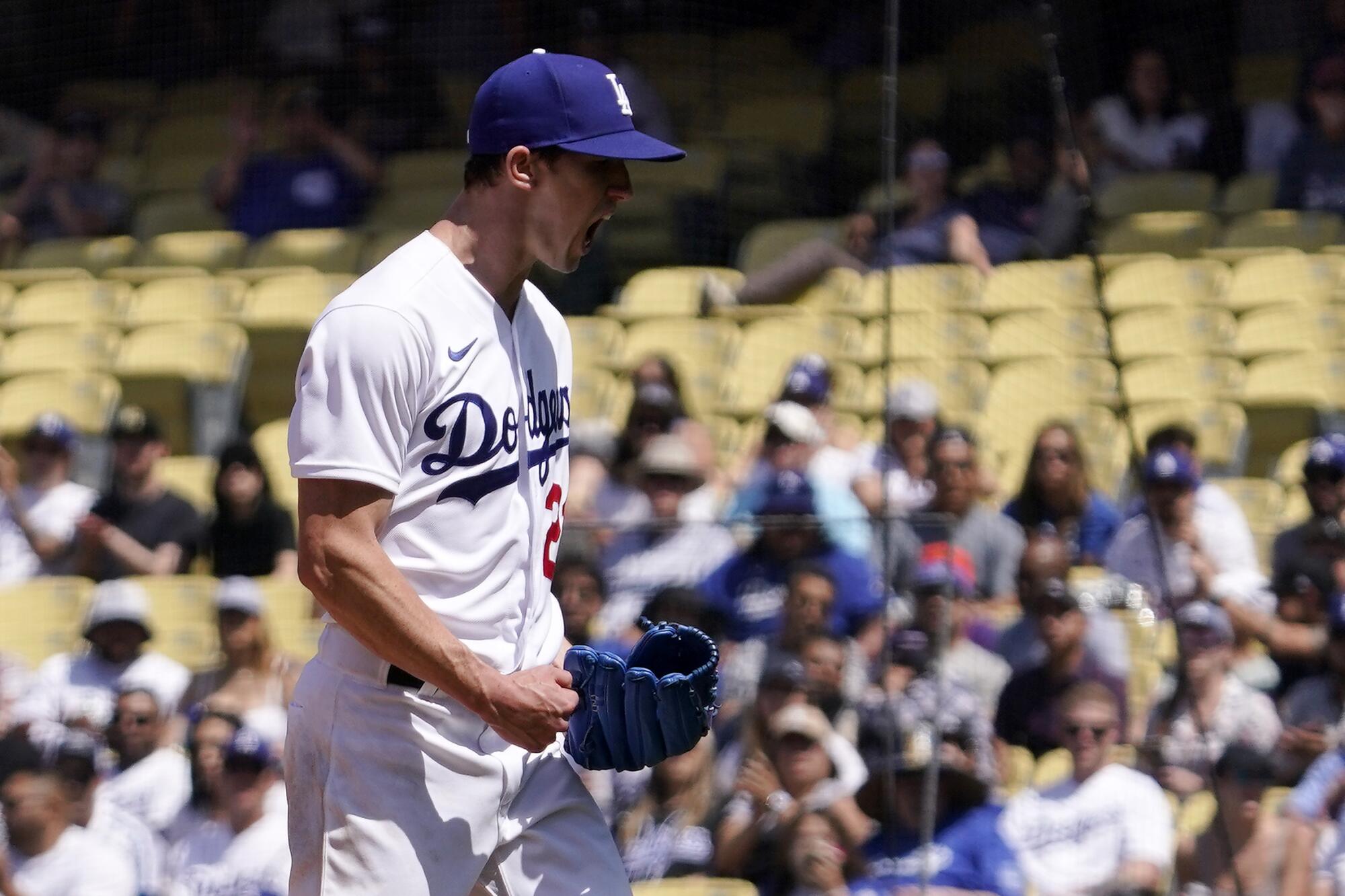
Then, there’s the matter of his actual stuff, typically among the biggest questions for pitchers returning from a second Tommy John — something only a handful of starters, such as Nathan Eovaldi and James Taillon, have handled with much consistent success.
In his rehab stint last month, Buehler’s fastball averaged 94 mph, about a tick down from his 2022 average, which was already a drop from other years. The spin rates on his curveball and slider had also dropped, though it had notched up on other pitches such as his cutter.
One potential factor for the inconsistency, Buehler noted, was a lack of intensity at the minor league level.
“To be completely frank, there’s not a whole lot of [adrenaline] for me down there,” he said. “I wish there was for me to get going. I wish I didn’t sound so [crappy] to say that. But I think getting the adrenaline of pitching in the big leagues is something I’ve been looking forward to for a long time.”
The Dodgers, meanwhile, saw enough in Buehler’s weapons to be optimistic about his post-injury potential — especially after finishing his rehab stint with a five-inning, one-run start in Oklahoma City last week.
“I was really impressed because he was pitching,” Roberts said of his last rehab start. “I thought he used his entire pitch mix really well. The velocity was still there. And he was getting outs.”
Added Prior: “That one, it was like, ‘Dude, we’re not worried about the amount of pitches you throw. Just go pitch and see where it’s at.’ And hopefully, that freed him up to feel more convicted, more confident.”
In the biggest moment of his career, Buehler put complete faith in his most commanding pitch.
With the bases loaded and no outs in Game 6 of the 2020 National League Championship Series, Buehler dialed up 12 consecutive fastballs (including one cutter) to help him record three straight outs and escape a monumental jam.
The sequence was a microcosm of Buehler’s old heater-heavy game plans. While he enjoys a repertoire of curveballs, sliders and breaking pitches, a fastball capable of hitting the upper-90s has always come first and foremost.
The question now: What if he can’t attack quite the same way?
Roberts hinted at this reality when discussing Buehler’s return last week, acknowledging the 29-year-old’s need to probably adapt as he recalibrates his physical state and in-game mindset.
“I think he’s going to still be Walker,” Roberts said. “He’s going to be attacking.”
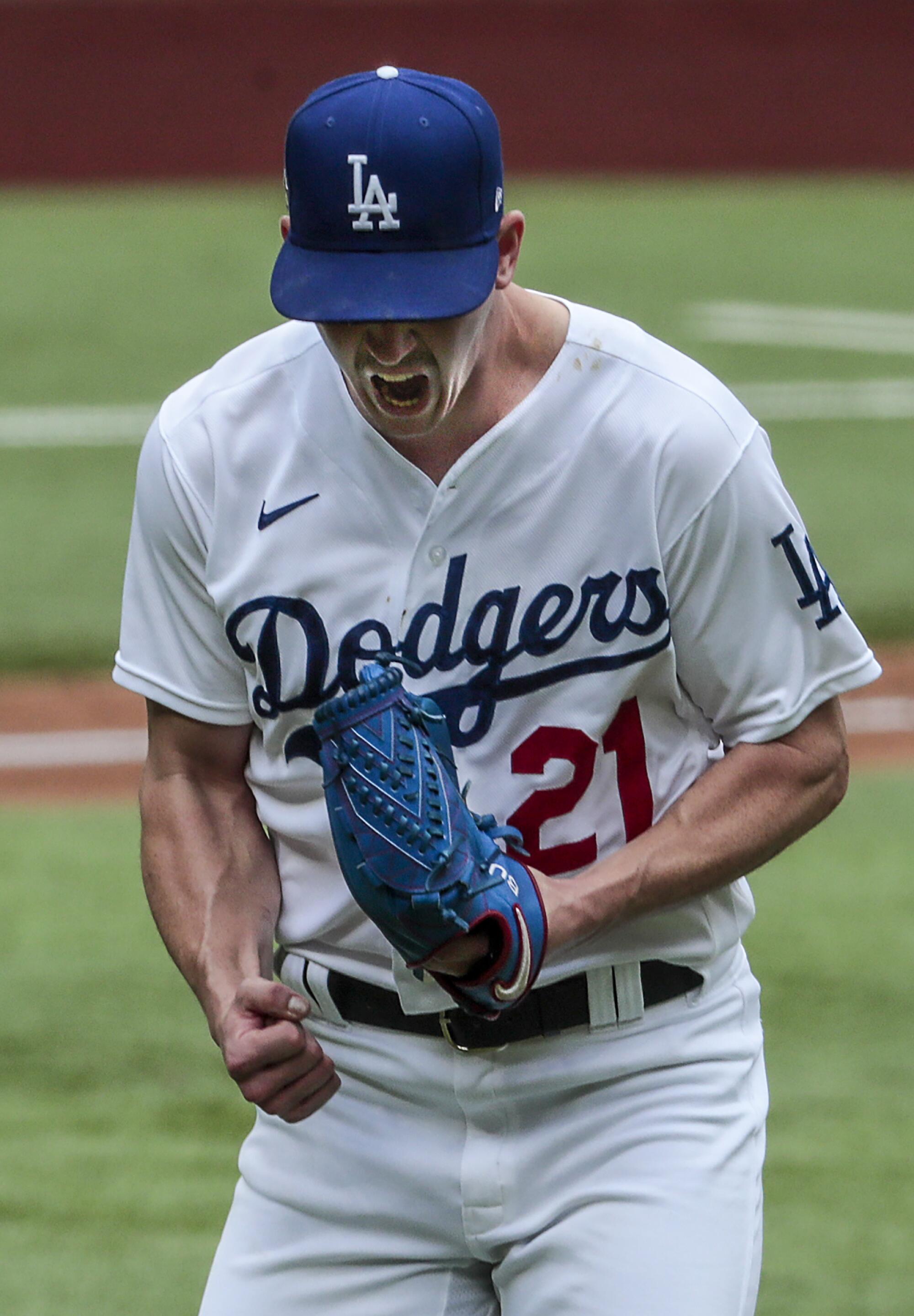
But …
“I think that there’s [a version of] attacking with his entire repertoire,” the manager added. “In years past, it was heavy fastball, heavy cutter — where I think that Walker has more weapons. And I think that’s what my hope is. [Using them] instead of just trying to bully guys.”
This is the duality Buehler — who still runs hot when he pitches, as his live batting practice sessions in the spring loudly displayed — will have to strike in his return to the mound.
On the one hand, he needs his fire, his competitive edge; the one that drove him at even the healthiest points of his career, and could help compensate for whatever velocity he has lost since then.
“It’s part of his superpower,” Friedman said. “And he’s really good at it.”
At the same time, however, overly relying on that in-zone aggression, or an overconfidence in his ability to blow guys away as he once did, could spell trouble in his transition back to major league competition.
“The game has changed in three years,” Prior said, noting the length of Buehler’s absence poses a problem. “It’s kind of weird to say. I don’t mean it’s changed drastically. But hitters continue to get better, continue to gameplan … and those are things that he’s going to have to relearn. Guys he used to be able to blow fastballs by or throw different pitches, a lot of these guys have gotten tremendously better.”
Add in a small regression in velocity or deception, and Buehler might have no choice but to maintain a more precise, crafty, patient pitch-by-pitch presence.
“He’s gonna have to figure those things out, and the only way to figure it out is to put him against big league hitters,” Prior said.
“As you haven’t been competing at this level for quite some time, [you have] to sort of feel, figure out, see where you’re at,” Roberts added. “I’m sure there’s going to be some anxiousness, some nerves, that there naturally should be, until you kind of get a couple starts under your belt.”
Ideally, it will be a quick process for Buehler and the Dodgers, one that could make the right-hander a vital piece in their long-term championship contention plans — and position him for an offseason payday that once seemed in question.
“He demands a lot and has high expectations for himself,” Prior said. “That hasn’t changed.”
Yet since his 2022 injury, so much else has.
He might be a similar pitcher. He might possess the same unrelenting mindset. But, to manage a return from a second Tommy John surgery that few others have mastered, Buehler might also have to formulate a new approach on the mound, and concoct a slightly altered recipe for success.
“It’s been a long time and a long process, but I finally put some things together,” Buehler said, looking forward to Monday’s first true test. “The delivery just works better when you’re amped up a little bit, so I’m looking forward to that.”
More to Read
Are you a true-blue fan?
Get our Dodgers Dugout newsletter for insights, news and much more.
You may occasionally receive promotional content from the Los Angeles Times.

